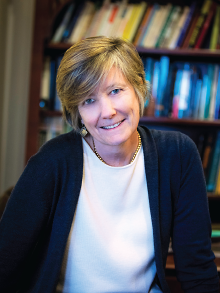“There is an enormous and very natural link between education and psychiatry.”
So says psychiatric educator Sallie DeGolia, M.D., associate training director for the adult residency program at Stanford University School of Medicine. She is one of a cadre of psychiatrists, vital to the future of the field, who has made education a principal component of her career. And though it is a “road less travelled” by most psychiatrists, for DeGolia the practice of psychiatry and the education of future psychiatrists are more or less seamless endeavors.
“I was primarily interested in psychotherapy, and I feel that education has been a natural outgrowth of that interest,” she told Psychiatric News in an interview. “It feels very familiar. Psychiatric treatment and especially psychotherapy is about helping someone develop, learn, and identify who they are and how to create a meaningful life.
“Similarly, a lot of what good education is about is relationship,” she said. “One of the foundations of education is having a good learning environment, and I see that as analogous to building a good therapeutic alliance with a patient. As in therapy, a good teacher connects with students to understand where they are, what they need, and how to help them get to where they need to go in the most efficient way.”
In almost 10 years as associate training director, she has earned the respect of leadership in the department and among fellow faculty and residents. In comments to Psychiatric News, Laura Roberts, M.D., chair of the Department of Psychiatry at Stanford, and colleagues cited DeGolia’s outstanding teaching in multiple settings as a clinical supervisor and didactic teacher, noting that she has brought special expertise to the department in time-limited dynamic psychotherapy. She has designed a range of highly effective innovative curricula, including international clinical rotations, and has spearheaded the use of the so-called “flipped classroom.” (The latter refers to the new trend toward providing online and other learning materials prior to didactic seminars to allow for a more interactive partnership between teachers and learners.)
Of particular note, DeGolia was selected to participate in the Stanford Advanced Leadership Development Program and is the associate chair of the Psychiatry Educational Leadership Integration Committee at Stanford.
“One has to meet Sallie to appreciate her enthusiasm for medical education, carefully thought-out plans, and caring nature,” Roberts said. “These and other qualities make her a wonderful role model and mentor for our residents and have allowed her to rise up in our education leadership team.”
Residency Education Is a Career
As with other educators who have spoken to Psychiatric News, teaching for DeGolia was not a career path she intentionally sought out. “It was never very clear in my mind that an educator is what I would become,” she said. “But I remember when I was a PGY-2 resident, a supervisor said to me, ‘Sallie, you’re a natural teacher.’ I never considered myself in that role, but the comment stayed with me.
“As chief resident at Stanford, I loved teaching,” she continued. “And beyond teaching, I loved developing programs and curricula—helping to identify what the learners needed to learn. That’s the area where I came to realize I had a fit and something to offer.”
Following residency, DeGolia supervised residents in the mood disorders clinic and then went into private practice, but she was called back to the department at Stanford to become associate training director in 2006. She credits a facilitator-training course in clinical teaching at the Stanford Faculty Development Center with deepening her interest in education. “These were some of the finest educators who really taught me the art and the elements of excellent teaching.”
Today, DeGolia says she is primarily focused on curriculum development, working with faculty to improve programs and to develop strategies to meet gaps in education and the needs of training 21st century psychiatrists. She is helping to develop a global health program in the department and chaired a committee of diverse faculty members to create a more effective teaching environment within the department.
As a psychotherapist, DeGolia has also made it a goal of hers to elevate the psychotherapy component of education at Stanford. “Historically we have been a biologically oriented program, and our residents come out of training very competent in psychopharmacology,” she said. “Though we have always taught psychotherapy, it’s been overshadowed.
“Even if young psychiatrists don’t pursue psychotherapy in their careers, I believe it is something we add to medicine that is so vital—our psychological understanding of our patients. I don’t want us to lose that capacity. So we’ve enhanced our didactics in psychotherapy and provide a variety of clinical opportunities for residents to do psychotherapy. I think we have a very balanced program today.”
Residents Find Mentors at “Meet the Faculty”
Mentorship is an area of special concern to DeGolia. “I never really felt like I had a mentor that I was able to go to in training on a consistent basis,” she said. “Mentors are hugely important in terms of helping trainees think about their career goals and how to realize them. Having a trusted mentor can make all the difference.”
So she has worked to create venues in which residents can meet potential mentors. DeGolia has initiated quarterly “Meet the Faculty” educational events where Stanford faculty with expertise in a given topic participate in an informal dinner with a few interested residents to discuss a career in that area. Stanford’s residency program also allows residents to explore their interests and potential career paths through scholarly concentration time in their second through fourth years. During this time, trainees are able to work on research or a variety of clinical, educational, or other projects they develop with an advisor.
“We encourage residents to take up something they are really interested in,” she said. “The program allows us to connect the residents with advisors who specialize in their area of interest and who may become a mentor down the line.”
DeGolia is also working to develop a more deliberate, intentional mentoring program within the department by surveying faculty and linking identified mentors with mentees. Also, she hopes to develop near-peer mentoring relationships between residents and medical students at Stanford—an initiative that may pay off not only by helping medical students better understand the field of psychiatry but also by potentially attracting more students to a career in psychiatry.
So what makes a good mentor and a good mentor-mentee experience?
“It’s about relationship,” she said. “A mentor needs to be someone who can listen and be genuinely interested in the mentee and what the mentee needs. I think sometimes when a mentoring relationship goes poorly, it’s because the encounter may focus more on the mentor’s needs rather than the student’s. Mentoring takes time. The mentor really needs to hear the mentee and help that individual student figure out what is best for him or her.” ■

